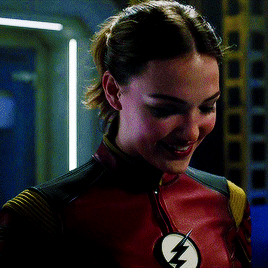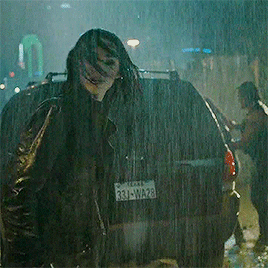Offline
Nov 22, 2014 16:38:14 GMT
Tag me @ruth
|
|
Post by ruth on Oct 23, 2014 16:06:23 GMT
Twenty-eight years. Twenty-eight years of mourning, of wondering, of wishing—twenty-eight years of thinking that everyone she’d known and loved before the war was long dead, and he appears on a television screen. Her little brother. Erik.
And apparently he was a terrorist now. Ruth added it to the list of things she was going to cover when she finally caught up with him. It went right after hugging him and throttling him in equal measure. And getting that wound tended to; Lord only knew what Erik’s idea of medical attention was and Ruth was not about to let a poorly tended injury so close to a critical artery kill him.
The fact that Washington, D.C. was a lot bigger than it looked on paper was conspiring to drive Ruth insane. He couldn’t have gone far, not with that injury. Blood loss alone would leave him too dizzy to make it out of the city limits. She called every no-name little clinic in the city—like hell Erik would go to one of the bigger hospitals after dropping a baseball stadium on the White House that little shit—and immediately looked to the parks. Some place isolated, where he could be relatively sure that no one would stumble across him. There was only park that made sense, and that was Rock Creek Park. Unless he had allies living within D.C., a park the size of Rock Creek was most likely his best bet.
It was really a stroke of luck that she ran into Rigby; the massive man with more strength than he should have and a sense of smell that would give a bloodhound a run for its money was proving himself quite invaluable as they entered the park and he looked for the scent of blood. Ruth had tricked him into thinking that she was able to see the future (most of it was just a matter of paying attention to details), but it wasn’t a cover that was going to last for too long.
“Hey, Ruth, I got blood!”
“Then let’s follow the trail,” she said. Erik, you’d better be okay.
|
|
Offline
Nov 22, 2014 16:38:14 GMT
Tag me @ruth
|
|
Post by ruth on Oct 23, 2014 2:48:13 GMT
Character Basics
.:Name of Character:. Ruth Lehnsherr Anderson
.:Species:. Human
.:Alias:. Ruthie (by mother and husband only)
.:Year Born/Timeline:. March 30, 1927
.:Affiliation:. Neutral/X-Men
Appearance
.:Physical Appearance:. Ruth has long reddish-brown hair that she tends to keep up in a French braid and hazel eyes. She was born with darker hair that lightened throughout her childhood. In terms of her facial features, she most closely resembles her mother. Ruth tends not to wear makeup regularly and only does so on special occasions. There is a tattoo on her left forearm from when she was imprisoned in Auschwitz-Birkenau, and she tends to wear long sleeves in order to keep it private. When she does wear short sleeves, she uses makeup to keep it hidden, as she doesn’t want people to see the mark and pity her for it.
.:Height:. 5’5’’ (1.65m)
.:Portrayed by:. Monika Buchowiec
Personality
.:Personality:. Ruth has always been hot-headed. She’s incredibly active and spent a lot of her childhood doing things most considered “unladylike” with a near manic glee. Though rather short-tempered, Ruth tries to maintain a degree of levelheadedness. Like her brother, Ruth has a strong sense of justice and what is right and she is not afraid to stand up and fight for it. She’s a veteran of two uprisings in Warsaw, Poland, and spent a good deal of the war working with the Resistance—much to her mother’s concern. However, as strong as her sense of justice is, Ruth’s morality is also incredibly strong. She is perfectly capable of killing but she’s much better as a healer and she wants to be able to save as many as she can. Ruth considers love and kindness to be strengths all on their own, and it’s her deep commitment to being loving and kind that gives her the strength she needs to stand straight and proud against her foes.
While Ruth tries to remain calm and level-headed, she often gets swept up in her emotions—especially with regards to anger. Ruth is rather quick to anger and when she gets angry, it burns hot and fast and she tends to act rashly. She’s not too dramatic and prefers things to be as straightforward as possible, but when in a foul mood she can easily slip into melodramatics. As much as she likes planning and knowing the layout of the land, so to speak, Ruth is very good at making split-second decisions and makes them often. She thrives under pressure and is very good at noticing details others tend to miss.
.:Powers/Abilities:. Problem Solving (Ruth is very good at thinking outside of the box and coming up with creative solutions to problems as they come up.); Sharpshooting (Ruth has become an excellent shot due to her experiences in Warsaw during the war; she’s an accomplished sniper and can shoot a cigarette out of someone’s mouth from twenty paces.); Quick reflexes (She can move very quickly and it’s saved her life on more than one occasion)
.:Weaknesses:. Post-Traumatic Stress Disorder/PTSD (As a result of her near constant embroilment in violent conflict and her experiences in Auschwitz, Ruth suffers from PTSD – however, she tries to ignore it.); Stubbornness (Ruth is incredibly stubborn; once she’s gotten an idea in her head, there’s not much that can stop her.); Temperament/Impulsiveness (Ruth becomes very impulsive when she’s incised and it’s not always a good thing.)
History
.:Birthplace:. Dusseldorf, Germany
.:Family:.
- Jakob Lehnsherr (Father, dead)
- Edie Lehnsherr (Mother, dead)
- Erik Lehnsherr* (Younger brother, living)
- Pietro Maximoff* (nephew, living)
- Wanda Ashni Bedi* (niece, living)
- Lorna Dane* (niece, living)
- Howard Anderson* (husband, living)
- Alicja Stolarz Anderson* (adopted daughter, living)
- Leonard Pasternak Anderson (adopted son, living)
- Mirek Kaminski Anderson* (adopted son, living)
- Silvie Sokol Anderson (adopted daughter, living)
- Urszula Levine Anderson (adopted daughter, living)
(* indicates mutant relative.)
.:Occupation:. Doctor (local clinic in North Salem, New York)
.:Current Location of Residence:. North Salem, New York, U.S.A.
.:History:. Ruth Lehnsherr was born in Dusseldorf, Germany in 1927 to Edie and Jakob Lehnsherr, and spent the first five years of her life there. When the National Socialist Party began to become increasingly prominent, the Lehnsherrs fled Germany for Poland, where Jakob opened up a shop and Edie gave birth to a son, Erik. Ruth spent most of her childhood attending school—where she excelled in maths, science, and English—and helping her parents out around the shop along with her little brother. She expressed a talent for numbers and languages, mastering Polish along with her native German by the time she was seven and picking up English almost as rapidly. Despite her mother’s efforts to the contrary, Ruth was a very rough-and-tumble child, often getting into scuffles with her fellow students and it was practically expected for Ruth to return home with torn stockings and mud-splattered, grass-stained dresses.
While their lives in Warsaw were relatively peaceful (Ruth’s escapades aside), Edie and Jakob kept a wary eye on the world outside of Poland and listened as Germany slowly but surely began to expand under the rule of Adolf Hitler. Ruth, whose interests in politics was limited but still present, would join her parents on occasion and listen to the radio reports in the evenings. She didn’t know what precisely the reports meant, given her limited knowledge of politics and war, but she was very much aware of the growing tension in Warsaw. This tension came to a head in 1939, when Germany and the Soviet Union invaded Poland and overtook Warsaw. At only twelve years of age, Ruth was incredibly frightened of what the invading German and Soviet armies would mean for herself and her family. By the beginning of October, western Poland was annexed into Germany.
Hardly a year later, at age thirteen, Ruth stumbled across a resistance meeting and immediately demanded to become involved. Due to her young age, she was only given little tasks, primarily message delivery. By October 1940, the Lehnsherrs along with virtually all of the Warsaw Jews, were forced to relocate to the newly established Warsaw Ghetto. As Jewish citizens found their freedoms continually limited and revoked entirely, Ruth became more and more active in the resistance, secretly acquiring medical training from the nurses and doctors in the ghetto. With disease and starvation claiming lives daily, Ruth often spent her free time hunting down food for her family and whoever else she could manage to feed, most typically children. When rumors began to crop up about a liquidation of the ghetto—and therefore the deportation of all the residents to Treblinka, a notorious death camp—Ruth immediately made arrangements to smuggle her family out of the ghetto and into a safehouse.
The liquidation of the Warsaw Ghetto blew up into a massive uprising that lasted nearly a month, from mid-April to mid-May. Ruth barely managed to get her family out in time, and she spent the uprising working to smuggle other residents out, mostly children smuggled out to Catholic orphanages willing to take them in and keep them hidden. She fought alongside other resistors, armed with little more than a knife, some grenades, and a few Molotov cocktails. While the majority of the resistors were killed and thousands were sent to Treblinka, Ruth managed to escape and joined her family in hiding.
Ruth’s smuggling trick managed to keep the family out of the camps for nearly a year, but their safehouse was found out and raided in mid-February while Ruth was out on a supplies run with a few other resistance members.
In the months that followed, Ruth remained in hiding with her fellow resistors and tried desperately to find out where her family was sent. She kept getting mix results—some said Treblinka, others were certain of Auschwitz, and still a few told her that they were shot dead somewhere outside the city—and another uprising was brewing. Ruth fought in the 1944 Warsaw Uprising, a fierce effort on the part of the citizens of Warsaw to take back their city. The fighting went on for two months, and Ruth took up a rifle and became a fantastic sniper. The rebels were meant to force the Germans out of the city in order to help the approaching Soviet Army take control of Warsaw, but the Germans eventually overwhelmed the Polish rebels. Ruth was captured on the second to last day of the uprising, and was immediately transported to Auschwitz-Birkenau where she was meant to be killed. However, the guards deemed her too pretty to kill immediately and decided instead to chain her up and violate her. Ruth managed to keep her wits about her for the three and half months she spent imprisoned in Auschwitz and when her shackles miraculously fell apart in mid-January, Ruth took her opportunity to escape.
She killed three guards in her escape, not having time to exact revenge on everyone who took advantage of her while she was chained up, and escaped the camp. She ran—almost quite literally—into a Soviet unit marching in the general direction of Auschwitz. Ruth managed to convince the unit’s leader to go liberate the camp and she led them straight to Auschwitz’s gates, taking the opportunity to hunt down and kill any of her violators who had been stupid enough to remain. In the aftermath of liberation, Ruth helped some of the survivors return to their homelands and tried to help the surviving children find their families—if they had any family left to find. There were five children who had no family left, and so Ruth decided to take them in. They returned to Soviet-occupied Warsaw until the Allies declared victory in Europe, after which they made their way to western Germany, where they entered a refugee camp.
At the refugee camp, Ruth offered to assist the staff in whatever ways she could, ranging from nurse to cook to secretary. She met a U.S. soldier by the name of Howard Anderson, and the two developed a romance over the months they were there. When it came time for Howard to return to the U.S., Ruth and the children decided to immigrate to the United States. Ruth pursued a medical degree at a local New York university and became a doctor with a small practice in North Salem, New York. She and Howard were married in 1955, and Howard formally adopted the children.
Sample Post
The metal of her mother’s favorite broach was warm in her hands, her fingers rubbing the worn silver and the polished emerald green enamel of the leaves. Her mother had adored it, a dove with an olive branch in its beak, just like the one that proved to Noah that the flood was over. Before the Germans invaded Poland, her mother had worn it all the time with pride. It had been a gift from Papa one year for their anniversary. Then the Germans came, and all of Mama’s pretty things were locked up for safety.
Ruth exhaled and rested her head back against the wall. Mama wasn’t nearby anymore. Neither was Papa nor Erik. They’d been betrayed and taken away to die. Ruth’s eyes stung as she thought about it. Some said Auschwitz, most said Treblinka, others claimed that they were shot dead into mass graves like so many others. No one seemed to know for sure and Ruth was getting tired of trying to find out. There was an uprising brewing, one that they only needed to maintain until the Soviets reached Warsaw. When the Soviets arrived, then the Germans would be driven out for good and Warsaw would be safe again.
She got up off the floor and pinned the broach underneath her uniform jacket. The little brooch had protected her ever since Mama had slipped it into her pocket when they were leaving the ghetto behind. “A promise,” Mama had whispered, “that one day the world will get better.” Ruth squeezed her eyes shut and dragged a gloved hand over them, wiping away the tears.
The world would turn, and Ruth would be among those who made it do so.
|
|






